Forum for Global Challenges

The inaugural Forum for Global Challenges took place in Birmingham last week (3rd-5th May) with an aim of showcasing and generating solutions to the pressing issues faced by our planet and its people.
With more than 750 delegates, the hybrid event ran by the University of Birmingham at the ICC, tackled issues such as climate change and inequality and brought together leaders in business, policy, thought and academia from around the world.
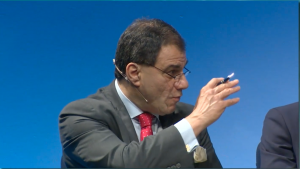
Lord Bilimoria
The University’s Chancellor Lord Karan Bilimoria, chaired a panel of leading businesses to discuss their sustainability journey and how other company can adopt similar strategies.
Lord Bilimoria is the founder and chairman of Cobra Beer and in addition to his business activity, he has been a member of the House of Lords for the past 16 years and President of the Confederation of British Industry.
Chairing the session – Business Summit: Accelerating a Sustainable Transition to Net Zero, the audience heard from panellists:
Vonjy Rajakoba – MD of Bosch UK & Ireland
Dermot McDonogh – COO of Goldman Sachs EMEA Region
Vaitea Cowan – founder of Enapter
Matt Hammond – Senior partner at PwC, WMGC chair
Simon Eaves – Market Unit Lead, UK & Ireland at Accenture
Michaela Wright – Head of Corporate Sustainability at HSBC
Marco Bartacca – CEO of Quorn
First however, the audience heard a video from Professor Ian Thomson, the director of the Lloyds Banking Group Centre for Responsible Business.
His research into how the public expect more from business community on environmental and social issues presented a gap between the two.
From the businesses surveyed:
- 45% had not incorporated any SDGS
- 50% had no net zero strategy
- 30% said the purpose of the business was to generate profit over sustainability, growth or purpose
Whereas the public felt that:
- 96% of businesses should work towards SDGS
- 74% businesses should have a net zero strategy
- 7% thought businesses should generate profit over sustainability, growth or purpose
Lord Bilimoria asked the panel how their respective companies are tackling climate change and what further actions can be taken.
Vonjy Rajakoba – MD of Bosch UK & Ireland
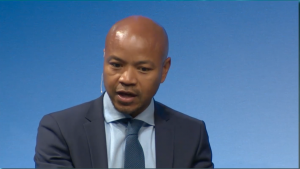
Vonjy Rajakoba
“Bosch is present in 60 countries. We achieved scope 1 and 2 of carbon neutrality in 2020 and we are the first industrial / manufacturer to achieve this worldwide.
“Being a manufacturer our emissions are a tangible challenge. Our electric consumption in 2018 was the same as the annual consumption of a country like Northern Ireland.
“We had to address that so we put in place a programme to be more efficient in electric consumption, to produce our own green electricity and use hydrogen ourselves.
“It is necessary to work together and help other manufacturers along that journey. We need to make others benefit from our experience that we’ve acquired”.
Dermot McDonogh – COO – Goldman Sachs EMEA Region
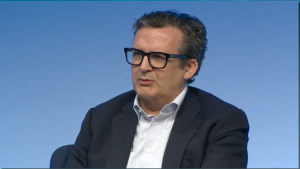
Dermot McDonogh
“For us, if you want to attract top talent you need climate change at the top of your agenda. Recently we’ve moved into new headquarters in London which are environmentally state of art and plastic free. Everything on top of that we have energy efficiency and carbon zero in mind.
“Over a 10 year period, we have committed $750bn of green financing – we’ve already gone through $250bn of that.
For ESG, the S is really important with inflation and cost of living crisis, climate change isn’t the top of the list and can be a rich persons problem and impact the poorest.
“We’ve committed to investing $10bn dollars to empower black women across the world to come out of the poverty trap which goes hand in hand with climate change”.
Vaitea Cowan – founder of Enapter

Vaitea Cowan
“We are working towards a mission of making green hydrogen cheaper than fossil fuels.
“By building a standardised and compact electrolyser that can be mass produced, it means we don’t need to choose between the environmental and scaling up.
“In terms of actionable items, it was important to establish the principles of urgency, simplicity and transparency
“By setting our objective key results on these principles, we can integrate the product that is affordable and accessible and accelerate energy transition”.
Matt Hammond – Senior partner of PwC, WMGC chair
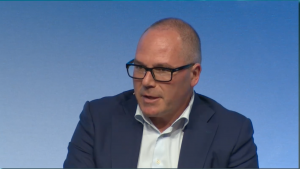
Matt Hammond
“We have proudly had a team produce a plan for the Commonwealth Games so that the games are as close to net zero as possible.
“As a professional services provider, we see many businesses at the foothills of this journey. Genuine collaboration is needed for those to share strategies along the journey.
“We’ve done the easy parts such as we don’t take on real estate that isn’t BREEAM Excellent, but hearts and minds need to get behind it.
“Unless we’re all in it we won’t get there”.
Simon Eaves – Market Unit Lead, UK & Ireland – Accenture
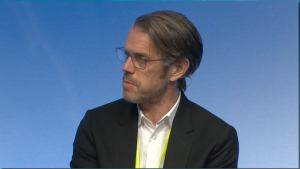
Simon Eaves
“Until we fix data and standards, many businesses are going to be exposures to green washing, so it’s a massive structural issue.
“We’ve done research to see how carbon lacks relevance for populace. The general public can’t access 1.5 degrees in carbon.
“People can access people and community however, so we’re seeing that’s a way into agency for people to see how they can make a difference”.
Michaela Wright – Head of Corporate Sustainability at HSBC
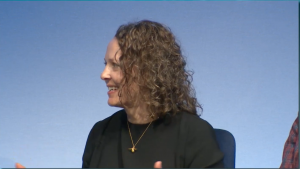
Michaela Wright
“We have issues right now and we may see increases in fossil fuels for the short term, but hopefully that need for energy security will spend up energy transition.
“Supporting our customers to transition is a huge part, therefore we’ve committed $1trillion for sustainable investments to bring together that intersection between environment and social.
“We have been supporting a big program working on nature based solutions to protect and restore solutions, but also a climate innovation project with the University of Birmingham – supporting startups to create new climate solutions”.
Marco Bartacca – CEO of Quorn
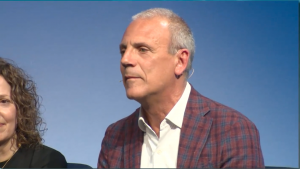
Marco Bartacca
“I believe in responsible businesses but more in responsible s that shape these businesses. Working in Asia I was confronted by a huge issue of obesity and lack of nutrition
“To be responsible as leaders is not easy, but to drive a business that has an intrinsic value in sustainability is challenging
“Quorn has a fantastic product that addresses peoples health and the planets health. By refocusing and going back to that purpose, it brings people back together.
“Putting people first is even more relevant than before. The most vulnerable are hid the most, so leaders have to decide how to help people irrespective of shareholders desires”.








